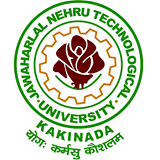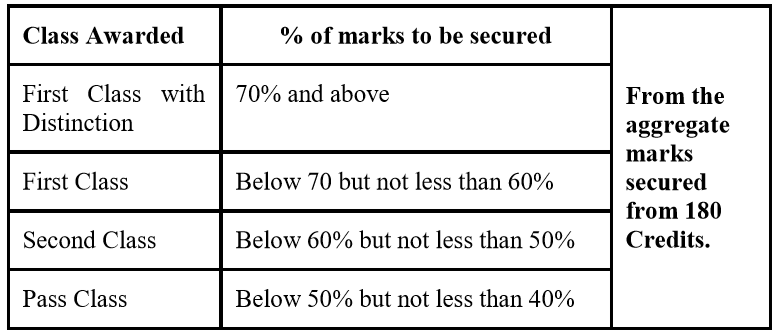Jntu kakinada B.Tech R13 academic regulations, JNTUK R13 Regulation b.tech academic regulations pdf, academic regulations for Lateral Entry Scheme.

JNTU kakinada B.Tech R13 Regulation Academic Regulations PDF
Academic Regulations R13 for B. Tech. (Regular)
(Effective for the students admitted in to I year from the Academic Year 2013-2014 and onwards)
1. Award of B.Tech. Degree
A student will be declared eligible for the award of the B. Tech. Degree if he fulfills the following academic regulations.
(a) A student will be declared eligible for the award of the B. Tech. Degree if he Pursued a course of study for not less than four academic years and not more than eight academic years.
(b) The candidate shall register for 180 credits and secure all the 180 credits.
2. Courses of study
The following courses of study are offered at present for specialization in the B.Tech. Course.
| S. No. | Branch |
| 01 | Civil Engineering |
| 02 | Electrical and Electronics Engineering |
| 03 | Mechanical Engineering |
| 04 | Electronics and Communication Engineering |
| 05 | Computer Science Engineering |
| 06 | Chemical Engineering |
| 07 | Electronics and Instrumentation Engineering |
| 08 | Bio – Medical Engineering |
| 09 | Information Technology |
| 10 | Electronics and Computer Engineering |
| 11 | Aeronautical Engineering |
| 12 | Bio – Technology |
| 13 | Auto Mobile Engineering |
| 14 | Petro Chemical Engineering |
| 15 | Mining Engineering |
| 16 | Petroleum Technology |
| 17 | Metallurgical Engineering |
| 18 | Agricultural Engineering |
And any other course as approved by the authorities of the University from time to time.
3. Distribution and Weightage of Marks
(i) The performance of a student in each semester shall be evaluated subject – wise with a maximum of 100 marks for theory subject and 75 marks for practical subject. The project work shall be evaluated for 200 marks
(ii) For theory subjects the distribution shall be 30 marks for Internal Evaluation and 70 marks for the End – Examinations.
(iii.) For theory subjects, during the semester there shall be 2 tests. The weightage of Internal marks for 30 consists of Descriptive – 15, Assignment – 05 (Theory, Design, Analysis, Simulation, Algorithms, Drawing, etc. as the case may be) Objective -10 (Conducted at College level with 20 Multiple choice question with a weightage of ½ Mark each). The objective examination is for 20 minutes duration. The subjective examination is for 90 minutes duration conducted for 15 marks. Each subjective type test question paper shall contain 3 questions and all questions need to be answered. The Objective examination conducted for 10 marks and subjective examination conducted for 15 marks are to be added to the assignment marks of 5 for finalizing internal marks for 30. The best of the two tests will be taken for internal marks. As the syllabus is framed for 6 units, the 1st mid examination (both Objective and Subjective) is conducted in 1-3 units and second test in 4-6 units of each subject in a semester.
Also Check: JNTUK B.Tech R13 Batch Securing of Credits
(iv.) The end semester examination is conducted covering the topics of all Units for 70 marks. Part – A contains a mandatory question (Brainstorming / Thought provoking / case study) for 22 marks. Part – B has 6 questions (One from each Unit). The student has to answer 3 out of 6 questions in Part – B and carries a weightage of 16 marks each.
(v.) For practical subjects there shall be continuous evaluation during the semester for 25 internal marks and 50 end examination marks. The internal 25 marks shall be awarded as follows: day to day work – 10 marks, Record-5 marks and the remaining 10 marks to be awarded by conducting an internal laboratory test. The end examination shall be conducted by the teacher concerned and external examiner.
(vi.) For the subject having design and / or drawing, (such as Engineering Graphics, Engineering Drawing, Machine Drawing) and estimation, the distribution shall be 30 marks for internal evaluation ( 20 marks for day – to – day work, and 10 marks for internal tests) and 70 marks for end examination. There shall be two internal tests in a Semester and the better of the two shall be considered for the award of marks for internal tests
(vii.) For the seminar, the student shall collect the information on a specialized topic and prepare a technical report, showing his understanding over the topic, and submit to the department, which shall be evaluated by the Departmental committee consisting of Head of the department, seminar supervisor and a senior faculty member. The seminar report shall be evaluated for 50 marks. There shall be no external examination for seminar.
(viii.) Out of a total of 200 marks for the project work, 60 marks shall be for Internal Evaluation and 140 marks for the End Semester Examination. The End Semester Examination (Viva – Voce) shall be conducted by the committee. The committee consists of an external examiner, Head of the Department and Supervisor of the Project. The evaluation of project work shall be conducted at the end of the IV year. The Internal Evaluation shall be on the basis of two seminars given by each student on the topic of his project and evaluated by an internal committee.
(ix.) Laboratory marks and the internal marks awarded by the College are not final. The marks are subject to scrutiny and scaling by the University wherever felt desirable. The internal and laboratory marks awarded by the College will be referred to a Committee. The Committee shall arrive at a scaling factor and the marks will be scaled as per the scaling factor. The recommendations of the Committee are final and binding. The laboratory records and internal test papers shall be preserved in the respective departments as per the University norms and shall be produced to the Committees of the University as and when they ask for.
4. Attendance Requirements :
1. A student is eligible to write the University examinations if he acquires a minimum of 75% of attendance in aggregate of all the subjects.
2. Condonation of shortage of attendance in aggregate up to 10% (65% and above and below 75%) in each semester may be granted by the College Academic Committee
3. Shortage of Attendance below 65% in aggregate shall not be condoned.
4. A student who is short of attendance in semester may seek readmission into that semester when offered within 4 weeks from the date of the commencement of class work.
5. Students whose shortage of attendance is not condoned in any semester are not eligible to write their end semester examination of that class.
6. A stipulated fee shall be payable towards condonation of shortage of attendance.
7. A student will be promoted to the next semester if he satisfies the (i)attendance requirement of the present semester and (ii) credits.
8. If any candidate fulfills the attendance requirement in the present semester, he shall not be eligible for readmission into the same class.
5. Minimum Academic Requirements:
The following academic requirements have to be satisfied in addition to the attendance requirements mentioned in item no. 4.
5.1 A student is deemed to have satisfied the minimum academic requirements if he has earned the credits allotted to each theory/practical design/drawing subject/project and secures not less than 35% of marks in the end semester exam, and minimum 40% of marks in the sum total of the internal marks and end semester examination marks.
5.2 A student shall be promoted from first year to second year if he fulfills the minimum attendance requirement.
5.3 A student will be promoted from II year to III year if he fulfills the academic requirement of 40% of the credits up to II year I semester from all the examinations, whether or not the candidate takes the examinations and secures prescribed minimum attendance in II year II semester.
5.4 A student shall be promoted from III year to IV year if he fulfils the academic requirements of 40% of the credits up to III year I semester from all the examinations, whether or not the candidate takes the examinations and secures prescribed minimum attendance in III year II semester.
5.5 A student shall register and put up minimum attendance in all 180 credits and earn all 180 credits. Marks obtained in all the 180 credits shall be considered for the calculation of percentage of marks.
6. Course pattern:
(i.) The entire course of study is of four academic years and each year will have TWO Semesters (Total EIGHT Semesters).
(ii.) A student eligible to appear for the end examination in a subject, but absent for it or has failed in the end examinations may appear for that subject’s supplementary examinations, when offered.
(iii.) When a student is detained due to lack of credits / shortage of attendance, he may be re-admitted when the semester is offered after fulfillment of academic regulations. Whereas the academic regulations hold good with the regulations he/she first admitted.
7. Award of Class :
After having satisfied the requirements prescribed for the completion of the program, the student shall be eligible for the award of B. Tech Degree and shall be placed in one of the following grades:

(The marks obtained in internal evaluation and end semester examination shall be shown separately in the memorandum of marks.)
8. Minimum Instruction Days:
The minimum instruction days for each semester shall be 90 working days
9. There shall be no branch transfer after the completion of admission process.
10. There shall be no transfer from one college/stream to another within the Constituent Colleges and Units of Jawaharlal Nehru Technological University Kakinada.
11. WITH HOLDING OF RESULTS :
If the student has not paid the dues, if any, to the university or if any case of indiscipline is pending against him, the result of the student will be withheld. His degree will be withheld in such cases.
12. TRANSITORY REGULATIONS :
1. Discontinued or detained candidates are eligible for readmission as and when next offered.
2. In case of transferred students from other Universities, the credits shall be transferred to JNTUK as per the academic regulations and course structure of the JNTUK.
13. General:
Wherever the words “he”, “him”, “his”, occur in the regulations, they include “she”, “her”, “hers”.
2. The academic regulation should be read as a whole for the purpose of any interpretation.
3. In case of any doubt or ambiguity in the interpretation of the above rules, the decision of the Vice-Chancellor is final.
4. The University may change or amend the academic regulations or syllabi at any time and the changes or amendments made shall be applicable to all the students with effect from the dates notified by the University.
5. The students seeking transfer to colleges affiliated to JNTUK from various other Universities/ Institutions have to pass the failed subjects which are equivalent to the subjects of JNTUK, and also pass the subjects of JNTUK on their own without the right to sessional marks which the candidates have not studied at the earlier Institution.
Academic Regulations R13 for B. Tech. (Lateral Entry Scheme)
(Effective for the students getting admitted into II year from the Academic Year 2014- 2015 and onwards)
Award of B. Tech. Degree
A student will be declared eligible for the award of B. Tech. Degree if he fulfils the following academic regulations:
1.1 A student shall be declared eligible for the award of the B. Tech Degree, if he pursues a course of study in not less than three academic years and not more than six academic years.
1.2 The candidate shall register for 132 credits and secure all the 132 credits.
2. The attendance regulations of B. Tech. (Regular) shall be applicable to B.Tech.
Promotion Rule
- A student shall be promoted from second year to third year if he fulfills the minimum attendance requirement.
- A student shall be promoted from III year to IV year if he fulfils the academic requirements of 40% of the credits up to III year I semester from all the examinations, whether or not the candidate takes the examinations and secures prescribed minimum attendance in III year II semester.
For more details Download the JNTUK B.Tech R13 academic regulations PDF Here – Click Here

320-x100(1).gif)
